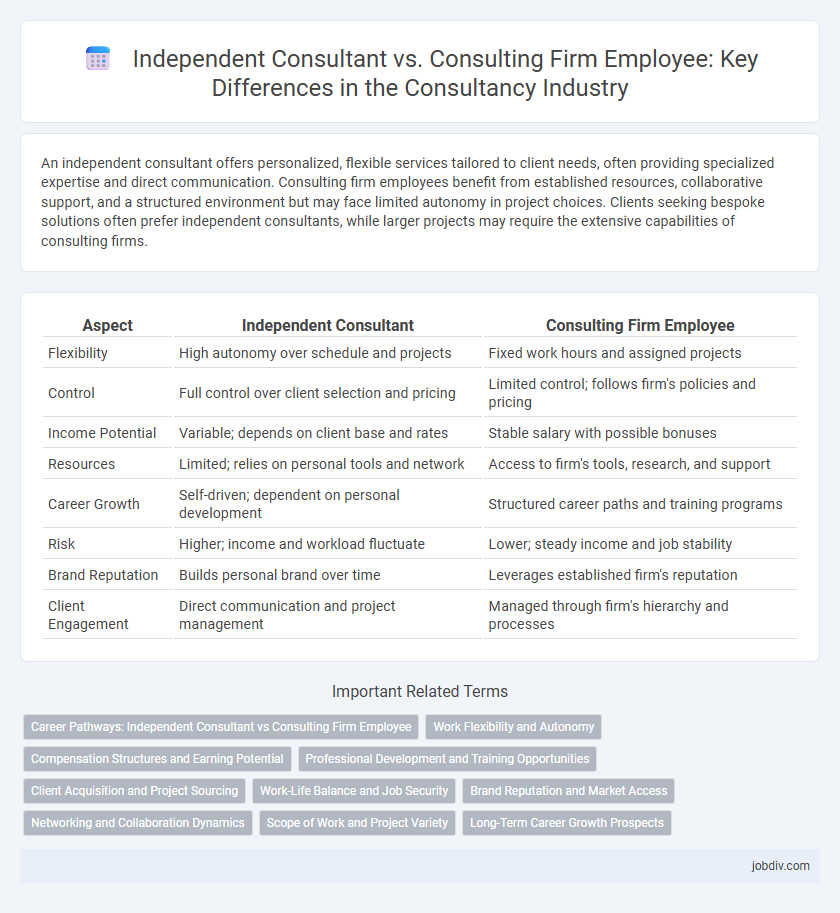An independent consultant offers personalized, flexible services tailored to client needs, often providing specialized expertise and direct communication. Consulting firm employees benefit from established resources, collaborative support, and a structured environment but may face limited autonomy in project choices. Clients seeking bespoke solutions often prefer independent consultants, while larger projects may require the extensive capabilities of consulting firms.
Table of Comparison
| Aspect | Independent Consultant | Consulting Firm Employee |
|---|---|---|
| Flexibility | High autonomy over schedule and projects | Fixed work hours and assigned projects |
| Control | Full control over client selection and pricing | Limited control; follows firm's policies and pricing |
| Income Potential | Variable; depends on client base and rates | Stable salary with possible bonuses |
| Resources | Limited; relies on personal tools and network | Access to firm's tools, research, and support |
| Career Growth | Self-driven; dependent on personal development | Structured career paths and training programs |
| Risk | Higher; income and workload fluctuate | Lower; steady income and job stability |
| Brand Reputation | Builds personal brand over time | Leverages established firm's reputation |
| Client Engagement | Direct communication and project management | Managed through firm's hierarchy and processes |
Career Pathways: Independent Consultant vs Consulting Firm Employee
Independent consultants enjoy flexible career pathways by selecting diverse projects across industries, allowing for skill diversification and entrepreneurial growth. Consulting firm employees benefit from structured advancement, clear promotion criteria, and access to extensive training programs that support specialization and leadership development. Career progression as an employee often involves moving from analyst to manager to partner, while independent consultants navigate growth through reputation building and client network expansion.
Work Flexibility and Autonomy
Independent consultants benefit from greater work flexibility, setting their own schedules and choosing projects aligned with their expertise, which enhances autonomy and decision-making control. Consulting firm employees often face structured hours, project assignments, and organizational protocols that limit independent decision-making but provide stability and team collaboration. The balance between flexibility and support varies significantly, influencing career satisfaction and productivity in consultancy roles.
Compensation Structures and Earning Potential
Independent consultants typically enjoy flexible compensation structures based on project fees, hourly rates, or retainer agreements, allowing direct control over their earnings and the ability to scale income with client acquisition. Consulting firm employees receive stable salaries combined with performance bonuses, benefits, and profit-sharing opportunities, offering financial predictability but limited earning spikes. Independent consultancy often offers higher earning potential per project but comes with variable income, while firm employees benefit from steady compensation and career advancement incentives.
Professional Development and Training Opportunities
Independent consultants often tailor their professional development by selecting specialized courses and certifications that align with their niche expertise, maximizing relevance and efficiency. Consulting firm employees benefit from structured training programs, mentorship opportunities, and access to a diverse skill development curriculum designed to support career progression within the firm. The choice between the two impacts access to continuous learning, with independent consultants having greater flexibility and firm employees gaining systematic growth support.
Client Acquisition and Project Sourcing
Independent consultants typically leverage personal networks and niche expertise to acquire clients directly, enabling tailored project sourcing and flexible engagement terms. Consulting firm employees benefit from established brand reputation, structured business development teams, and access to a broader client base through organizational resources. While independents control their client portfolio growth, firm employees rely on internal pipelines and firm-driven project assignments to secure engagements.
Work-Life Balance and Job Security
Independent consultants enjoy greater flexibility in managing work-life balance due to control over projects and schedules, but face fluctuating job security based on client demand. Consulting firm employees benefit from steady salaries and defined career paths, providing higher job security but often sacrificing flexibility due to fixed work hours and corporate policies. Balancing autonomy and stability is crucial when choosing between independent consulting and firm employment.
Brand Reputation and Market Access
Independent consultants build brand reputation through personalized client interactions and niche expertise, often leveraging digital platforms to enhance visibility. Consulting firm employees benefit from the established brand equity and extensive networks of their firms, granting broader market access and credibility. Market access for independent consultants can be limited compared to consulting firms, which offer structured resources and diversified client portfolios to penetrate various industries effectively.
Networking and Collaboration Dynamics
Independent consultants leverage diverse, personalized networks cultivated across multiple industries, enabling tailored collaboration with clients and specialists. Consulting firm employees benefit from structured, internal networking platforms that facilitate resource sharing and expertise pooling within the organization. Both roles demand strategic relationship-building, but independent consultants prioritize external connections, whereas firm employees focus on synergistic teamwork within a corporate environment.
Scope of Work and Project Variety
Independent consultants often have the flexibility to select diverse projects across multiple industries, allowing a broad scope of work tailored to their expertise and interests. Consulting firm employees typically work within defined roles and project parameters, focusing on specialized tasks within larger team-driven engagements. The variety of projects for independent consultants is influenced by market demand and individual networking, while consulting firm employees benefit from structured assignments and access to extensive organizational resources.
Long-Term Career Growth Prospects
Independent consultants benefit from flexible project selection, enabling specialized skill development that can enhance long-term career growth through diversified experiences and personal brand building. Consulting firm employees gain access to structured career advancement, mentorship programs, and extensive networking opportunities, which support steady progression and leadership development within established corporate frameworks. Evaluating long-term career goals, risk tolerance, and industry positioning helps determine the optimal path for sustained professional growth in consultancy.
Independent Consultant vs Consulting Firm Employee Infographic

 jobdiv.com
jobdiv.com